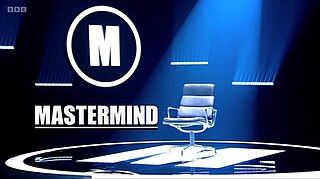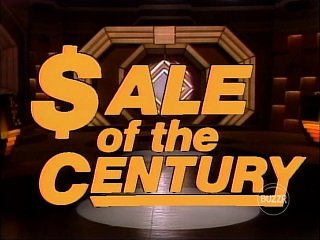
The Weakest Link is a British television quiz show, mainly broadcast on BBC Two and BBC One. It was devised by Fintan Coyle and Cathy Dunning and developed for television by the BBC Entertainment Department. The game begins with a team of nine contestants, who take turns answering general knowledge questions within a time limit to create chains of nine correct answers in a row. At the end of each round, the players then vote one contestant, "the weakest link", out of the game. After two players are left, they play in a head-to-head penalty shootout format, with five questions asked to each contestant in turn, to determine the winner.

Press Your Luck is an American television game show created by Bill Carruthers and Jan McCormack. Contestants answer trivia questions to earn "spins" on a randomly cycling game board. The board's spaces display cash, prizes, extra spins, special items, or the show's mascot, a cartoon creature known as the Whammy. Landing on a Whammy eliminates any cash and prizes accumulated while also displaying a short comedic animation. Its format is a revival of an earlier Carruthers production, Second Chance, which was hosted by Jim Peck and aired on ABC in 1977. The original version of Press Your Luck aired on CBS between 1983 and 1986. This version featured Peter Tomarken as host, Rod Roddy as announcer, and Carruthers as both director and voice of the Whammy. The original incarnation of the show gained significant media attention in 1984 for contestant Michael Larson, who won over $100,000 after memorizing the original pattern of the game board.

The Krypton Factor is a British game show produced by Granada Television for broadcast on ITV. The show originally ran from 7 September 1977 to 20 November 1995 and was hosted by Gordon Burns.

Mastermind is a British television quiz show for the BBC, currently presented by Clive Myrie. Its creator, Bill Wright, drew inspiration from his experiences of being interrogated by the Gestapo during World War II. The show features an intimidating setting and challenging questions. Four contestants face two rounds, one on a specialised subject of the contestant's choice, the other a general knowledge round.
Blankety Blank is a British comedy game show which first aired in 1979. The show is based on the American game show Match Game, with contestants trying to match answers given by celebrity panellists to fill-in-the-blank questions.

Blockbusters is a British television quiz show based upon an American quiz show of the same name. A solo player and a team of two answer trivia questions, clued up with an initial letter of the answer, to complete a path across or down a game board of hexagons.

Sale of the Century is an American television game show that originally debuted on September 29, 1969, on NBC daytime. It was one of three NBC game shows to premiere on that date, the other two being the short-lived game shows Letters to Laugh-In and Name Droppers. The series aired until July 13, 1973, and a weekly syndicated series began that fall and ran for one season.

A Question of Sport is a British television sports quiz show produced and broadcast by the BBC. It was the "world's longest running TV sports quiz". Following a pilot episode in December 1968, broadcast only in the north of England, the series ran from 1970 until production ceased in 2023. The final presenter was Paddy McGuinness, with team captains Sam Quek and Ugo Monye.
Masterteam was a BBC Television daytime quiz programme that aired on BBC One from 21 October 1985 until 21 December 1987. The programme was hosted by Angela Rippon.

Celebrity Squares is a British comedy game show based on the American comedy game show Hollywood Squares. It first ran on ITV from 20 July 1975 to 7 July 1979 and was hosted by Bob Monkhouse, then—also hosted by Monkhouse—from 8 January 1993 to 3 January 1997.
Going for Gold is a British television game show that originally aired on BBC1 between 12 October 1987 and 9 July 1996. It was revived for Channel 5 from 13 October 2008 to 20 March 2009.
Saturday Superstore is a British children's television series that aired on BBC1 from 2 October 1982 to 18 April 1987. It was shown on Saturday mornings with presenters including Mike Read, Sarah Greene, Keith Chegwin, and John Craven. The show was very similar to its predecessor Multi-Coloured Swap Shop, which had ended the previous October–March season following its presenter Noel Edmonds moving away from children's TV to present his prime-time Late Late Breakfast Show.
Bob's Full House was a British television quiz show based on the game bingo. It aired on BBC1 from 1 September 1984 until 27 January 1990, and was hosted by Bob Monkhouse.
Odd One Out is a British game show based on the American version entitled Knockout. It aired on BBC1 from 16 April 1982 to 19 April 1985 and was hosted by Paul Daniels. The show is based on a short-lived American game show produced by Ralph Edwards called Knockout, hosted by Arte Johnson.
Turnabout was a BBC Television daytime quiz programme that aired on BBC1 from 26 March 1990 until 7 October 1996. The programme was hosted by Rob Curling.
The Movie Game is a game show that ran from 8 June 1988 to 25 December 1995 on BBC1. The format is three teams of two players answering questions about films, the team with the fewest points at the end of the first round are eliminated. The other two teams moved on to a board game-style end game. The winning team could, depending on the points they earned, move on to the series final and the winner of that would win a film related prize such as meeting Steven Spielberg. Most show's from the last 2 series featured a celebrity guest.
First Class is a British game show that originally aired as a regional programme for BBC Wales from 3 October to 19 December 1984 with Louise Bachelor as host. It was then networked on BBC1 and recorded in the BBC's Scotland studios in Glasgow, with broadcasts from 8 January 1986 to 21 August 1988 with Debbie Greenwood as host. Series 1 was shown on Wednesdays, Series 2 & 3 on Wednesday & Thursday evenings, and series 4 was moved to Saturday evenings in 1988.
This is a list of British television related events from 1987.
4 Square was a British game show that aired on BBC1 from 3 May 1988 to 31 October 1991. It was hosted by Michael Groth for the first series and then hosted by John Sachs for three subsequent series.
The Alphabet Game is a comedy panel game show that aired on BBC1 from 5 August 1996 to 27 March 1997 and is hosted by Andrew O'Connor. The programme was created by O'Connor, Rebecca Thornhill, Mark Maxwell-Smith and produced by Objective Productions. It was remade in Spain as Pasapalabra, for which ITV Studios sued Telecinco for €17,000,000; ITV would later remake the show as Alphabetical.








